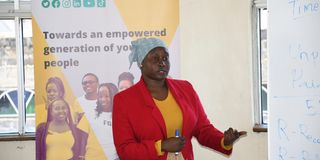Alvin Sam: Domestic worker turned human rights activist

Alvin Sam, during an interview on September 10, 2024.
After clearing high school in 2013, Alvin Sam had hoped to get a good job and change the living standard around his home.
Coming from a very humble background, he believed he had a responsibility to change the status quo of the family and better his future.
To his dismay, things didn't go as expected as no dignified job was forthcoming.
But with nowhere else to get support, Alvin opted to take whatever was at his disposal in order to make ends meet.
His friend linked him to another friend who employed him as a domestic worker. His main responsibilities were cleaning the utensils, laundry work, feeding cows as well as landscaping.
All this was at a salary of Sh 5,000. However, he would supplement his income by cutting grass for the cattle which he sold to the employer at Sh 30 per 90 kg sack.
For three years, Alvin had to contend with this hard labour with little compensation hoping for better things in future.
However, an incident with his employer saw him decide to call it quits.
After spending a whole day in the field cutting grass for the cattle, he brought about five sacks hoping to get Sh 150 from his boss.
But to his disappointment the employer made sure all the grass from the five sacks fitted into one sack and paid him Sh 40.
“It really broke my heart to see the employer take advantage of my desperation to unfairly underpay me. This is when I realized that neither my needs nor rights mattered to him so I chose to leave,” he says.
That is when he decided to go out and try something else starting from the construction work before specializing in painting.
However, the bitterness he carried from the employer gave him the urge to do something as he never wanted to see any other domestic worker go through what he experienced.
This is when he started speaking out against the violation of domestic workers’ rights in the hands of their bosses.
Now at 30 years, Alvin is one of the vocal male champions for the rights of paid domestic workers.
Speaking in one of the advocacy forums that was organized by the Youth Alive organization, Alvin says his intention is to change the perception and narrative around domestic workers.
“I advocate for the equitable distribution of human rights regardless of employment status, religion and political affiliation. We can make things better by respecting each other’s hustle and rights."
"Let the employers pay the domestic workers their minimum wage and respect all their rights to leave days among others,” says Alvin.

Ms Issa Rahma who is the program officer at Youth alive adressing domestic workers representatives on September 10, 2024.
Ms Issa Rahma who is the program officer at Youth alive says the organization is running a program dubbed time to care, which seeks to bring into context the issues of paid and unpaid care workers.
“Our aim is to make sure domestic work is recognized, reduced, represented, redistributed and rewarded,” says Ms Rahma.
